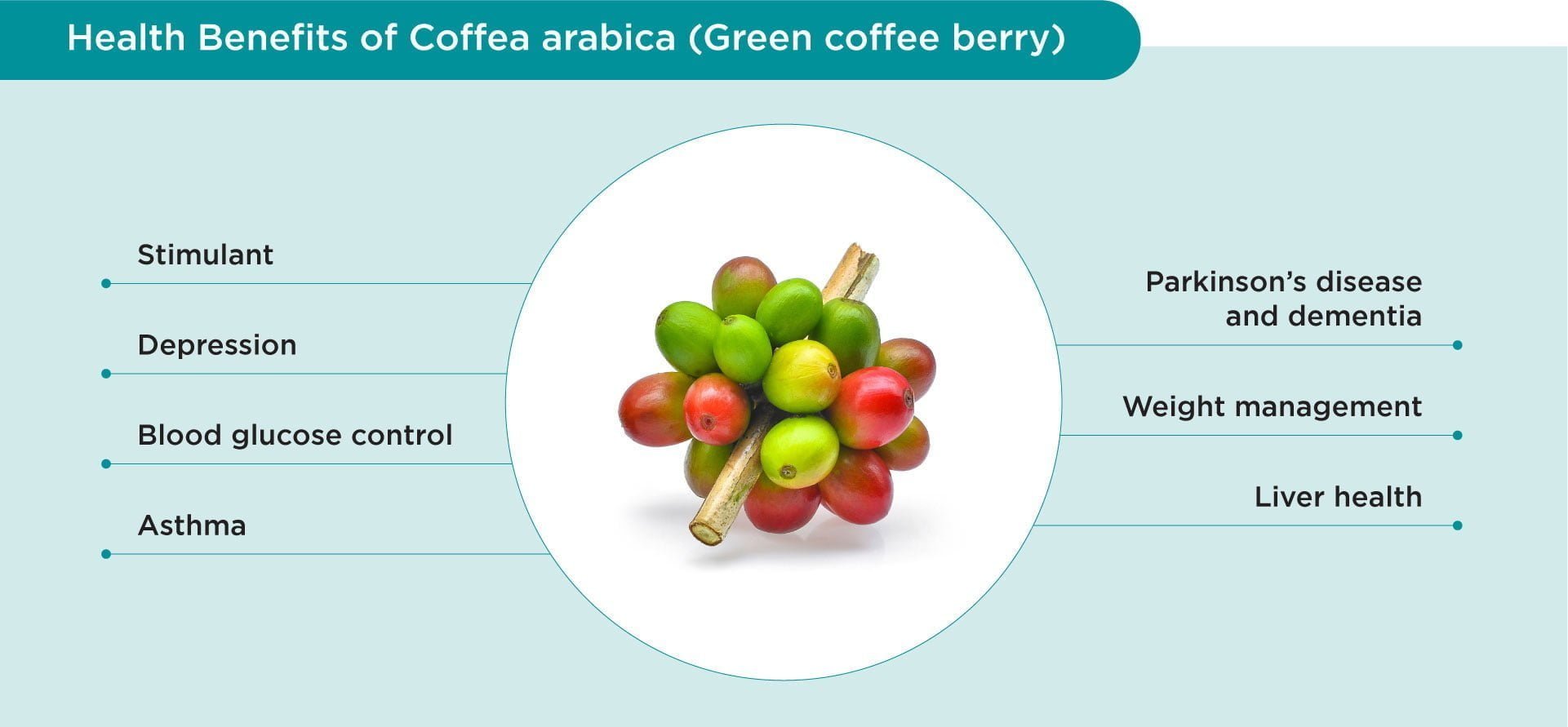Coffee Arabica (Green Coffee)

Coffee Arabica (Green Coffee)
Green coffee is coffee that has been peeled and not roasted 1. The name coffee is derived from the plant Coffea arabica, which is a medium-sized tree from the Rubiacea family 1. Coffee is the most popular beverage after water and is consumed worldwide in daily amounts of approximately 1.6 billion cups. It was cultivated in Arabic countries in the first century, and then later in Iran and India. The main producers of this plant currently are Brazil and Columbia 1. Traditionally, different parts of the coffee plants are used for influenza, anemia, edema, asthenia and rage, hepatitis and liver troubles, as a stimulant for sleepiness and drunkenness, as an antitussive in flu and lung ailment, as a cardiotonic and a neurotonic and for asthma 1.
Nutritional Facts
Coffee contains a great source of natural antioxidants such as polyphenol compounds. Typically found polyphenols include caffeine, chlorogenic acid, diterpenes and trigonelline 1. Coffee also contains essential nutrients such as vitamin B2, vitamin B5, manganese, potassium, magnesium, and niacin 1.
Published Health Benefits
1. Stimulant
Caffeine found in coffee has stimulant effects on the brain at the optimum dose. It reduces the adenosine transmission in the brain. This adenosine is the general inhibitor of neuronal activity involved in the regulation of arousal, sleep and cognition 2,3. By reducing adenosine activities, caffeine can help to boost the level of alertness and cognitive performance.
2. Depression
Acid content in coffee such as chlorogenic acid, ferulic acid, and caffeic acid can help to reduce the inflammation of nerve cells in the brain of people with depression; while caffeine can increase the sense of well-being and energy 4,5. Large longitudinal study found that taking 4 cups of coffee per day had a 20% lower risk of becoming depressed 5.
3. Parkinson’s disease and dementia
Meta analysis has shown the risk of Parkinson’s Disease is 30% lower among coffee drinkers than non-coffee drinkers 6. Caffeine exerts its neuroprotective effect by protecting the multitaskers microglial cells in the brain and also help prevent cognitive decline in dementia 7,8.
4. Weight management
Caffeine intake is associated with reduction in body weight, body mass index (BMI), and body fat 9. It improves metabolic rate by stimulating release of hormone adrenaline into the bloodstream which helps to break down fat from fat tissues. Besides, caffeine has a mild diuretic effect which may help to reduce body water weight without causing dehydration in habitual consumers 10.
5. Blood glucose control
Studies have shown that taking more than 3 to 4 cups of both coffee and decaffeinated coffee reduces the risk of developing type 2 diabetes 11. However, the protective effect of coffee against diabetes through the regulation of glucose metabolism and insulin secretion in humans is still uncertain 11.
6. Liver health
Research has found that coffee drinkers have a much lower risk of cirrhosis that is caused by several liver diseases 12,13. Coffee exerts its liver protecting effect by reducing liver enzymes levels which indicate liver damages such as aspartate aminotransferase (AST), alanine aminotransferase (ALT), gamma-glutamyltransferase (GGT), and alkaline phosphatase (ALP), thus helping to preserve liver health and function 14.
7. Asthma
Caffeine has the similar effects as bronchodilator drug theophylline. Hence, it can help to widen airways in the lungs and relieve asthma symptoms such as wheezing, breathlessness, and coughing. Research has found that caffeine intake appears to improve airway function modestly, for up to 4 hours, in patients with asthma 15. Tolerance develops to the bronchodilatory effects of caffeine in habitual consumers is still unknown 15.
References:
1. Bisht, Shradha; Sisodia, SS (2010). Coffea arabica: A wonder gift to medical science. Journal of Natural Pharmaceuticals, 1(1), 58–65. doi:10.4103/2229-5119.73595
2. Cappelletti, S., Piacentino, D., Sani, G., & Aromatario, M. (2015). Caffeine: cognitive and physical performance enhancer or psychoactive drug?. Current neuropharmacology, 13(1), 71–88. https://doi.org/10.2174/1570159X13666141210215655
3. Nikić, Petar M.; Andrić, Branislav R.; Stojimirović, Biljana B.; Trbojevic-Stanković, Jasna; Bukumirić, Zoran (2014). Habitual coffee consumption enhances attention and vigilance in hemodialysis patients. BioMed Research International, 2014, 1–7. doi:10.1155/2014/707460
4. Pham, N. M., Nanri, A., Kurotani, K., Kuwahara, K., Kume, A., Sato, M., Hayabuchi, H., & Mizoue, T. (2014). Green tea and coffee consumption is inversely associated with depressive symptoms in a Japanese working population. Public health nutrition, 17(3), 625–633. https://doi.org/10.1017/S1368980013000360
5. Lucas, M., Mirzaei, F., Pan, A., Okereke, O. I., Willett, W. C., O’Reilly, É. J., Koenen, K., & Ascherio, A. (2011). Coffee, caffeine, and risk of depression among women. Archives of internal medicine, 171(17), 1571–1578. https://doi.org/10.1001/archinternmed.2011.393
6. Hernán, M. A., Takkouche, B., Caamaño-Isorna, F., Gestal-Otero, J. J. (2002). A meta-analysis of coffee drinking, cigarette smoking, and the risk of Parkinson’s disease. Annals of Neurology, 52(3), 276–284. doi:10.1002/ana.10277
7. Santos, C., Costa, J., Santos, J., Vaz-Carneiro, A., & Lunet, N. (2010). Caffeine intake and dementia: systematic review and meta-analysis. Journal of Alzheimer’s disease : JAD, 20 Suppl 1, S187–S204. https://doi.org/10.3233/JAD-2010-091387
8. Madeira, M. H., Boia, R., Ambrósio, A. F., & Santiago, A. R. (2017). Having a Coffee Break: The Impact of Caffeine Consumption on Microglia-Mediated Inflammation in Neurodegenerative Diseases. Mediators of inflammation, 2017, 4761081. https://doi.org/10.1155/2017/4761081
9. Tabrizi, R., Saneei, P., Lankarani, K. B., Akbari, M., Kolahdooz, F., Esmaillzadeh, A., et al. (2018). The effects of caffeine intake on weight loss: a systematic review and dose-response meta-analysis of randomized controlled trials. Critical Reviews in Food Science and Nutrition, 1–9. doi:10.1080/10408398.2018.1507996
10. R. J. Maughan; J. Griffin (2003). Caffeine ingestion and fluid balance: a review. , 16(6), 411–420. doi:10.1046/j.1365-277x.2003.00477.x
11. Huxley, R., Lee, C. M., Barzi, F., Timmermeister, L., Czernichow, S., Perkovic, V., Grobbee, D. E., Batty, D., & Woodward, M. (2009). Coffee, decaffeinated coffee, and tea consumption in relation to incident type 2 diabetes mellitus: a systematic review with meta-analysis. Archives of internal medicine, 169(22), 2053–2063. https://doi.org/10.1001/archinternmed.2009.439
12. Klatsky, Arthur L.; Morton, Cynthia; Udaltsova, Natalia; Friedman, Gary D. (2006). Coffee, Cirrhosis, and Transaminase Enzymes. Archives of Internal Medicine, 166(11), 1190–1195. doi:10.1001/archinte.166.11.1190
13. Kennedy, O.J., Fallowfield, J.A., Poole, R. et al. All coffee types decrease the risk of adverse clinical outcomes in chronic liver disease: a UK Biobank study. BMC Public Health 21, 970 (2021). https://doi.org/10.1186/s12889-021-10991-7
14. Heath, R. D., Brahmbhatt, M., Tahan, A. C., Ibdah, J. A., & Tahan, V. (2017). Coffee: The magical bean for liver diseases. World journal of hepatology, 9(15), 689–696. https://doi.org/10.4254/wjh.v9.i15.689
15. Welsh, E. J., Bara, A., Barley, E., & Cates, C. J. (2010). Caffeine for asthma. The Cochrane database of systematic reviews, 2010(1), CD001112. https://doi.org/10.1002/14651858.CD001112.pub2









